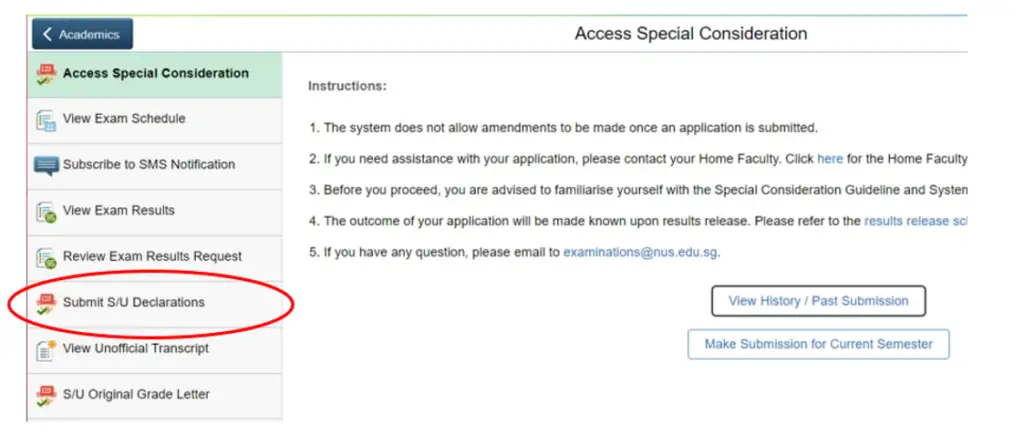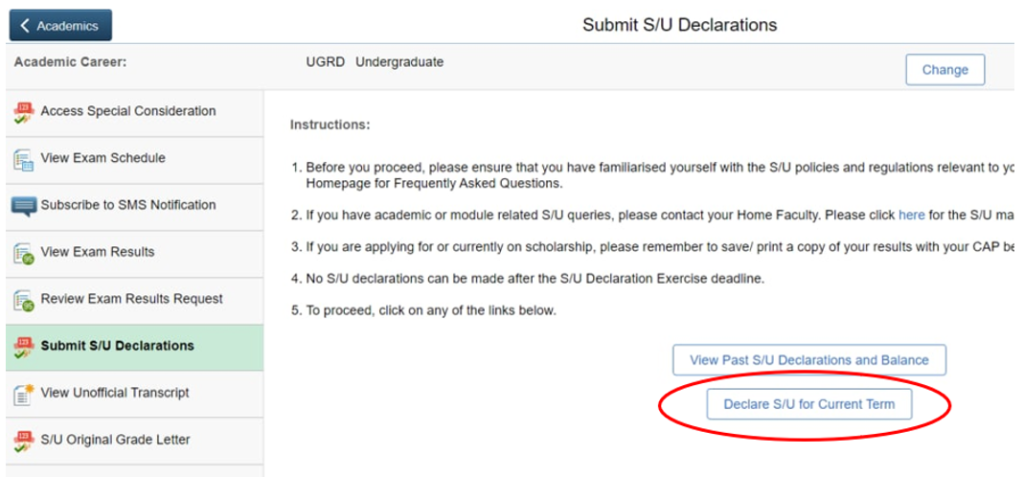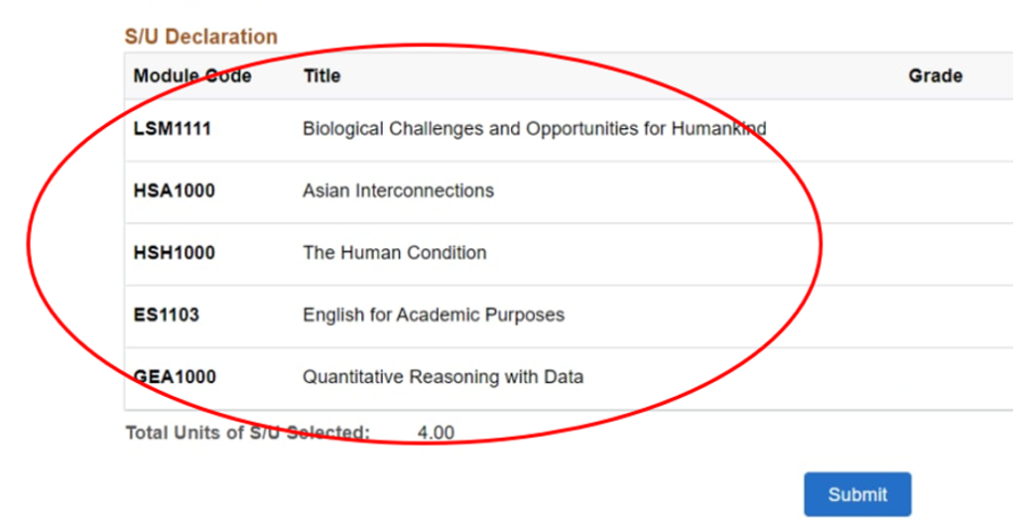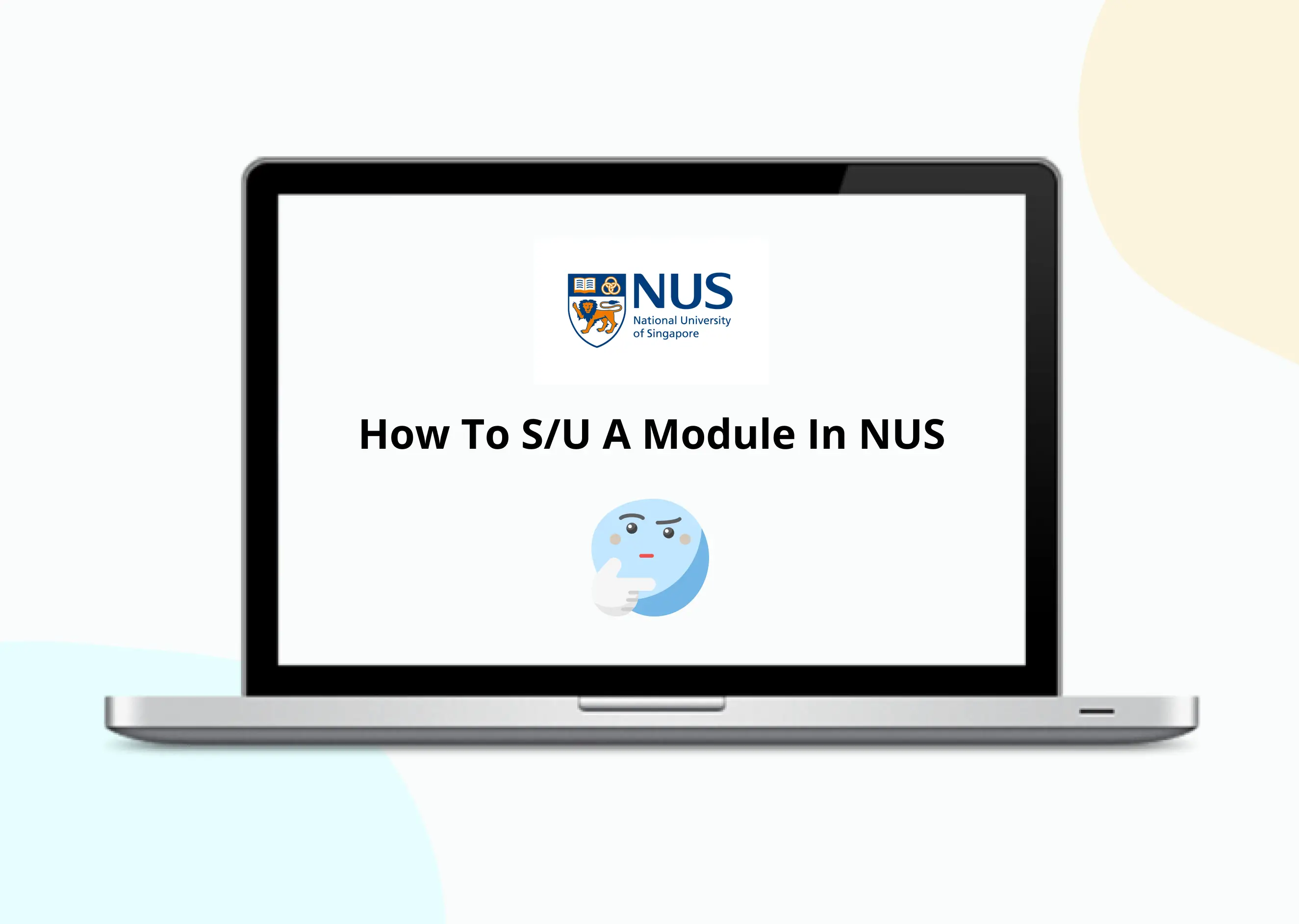As a fresh student of NUS, you might have heard of something known as the ‘S/U option’. If you’re like me, you might not have understood what exactly this ‘option’ entailed when it was first mentioned.
A brief summary for your understanding of what this ‘S/U’ option does is that – depending on your original module grade – you can choose to assign the module either an ‘S’ or ‘U’ grade to replace that original grade. Assigning either of the grades ‘removes’ the module’s original grade from the calculation of your CAP.
Thus, it is definitely a nifty tool for you to have to ensure that your CAP is not brought down by modules where you ended up scoring below your expectations!
Being something that you’ve probably never heard of or encountered before in Polytechnic or JC, it might be slightly confusing for you at first.
As such, here is a quick guide on how you can go about it!
Contents
- 1 How to S/U a module in NUS
- 2 Can I undo my S/U decision?
- 3 Which modules can I S/U in NUS?
- 4 Is there an easy way to identify which modules I can S/U?
- 5 When do I need to declare my S/U in NUS?
- 6 Can I S/U modules from my previous semester or just the current one?
- 7 How many S/Us can I use each semester?
- 8 Conclusion
How to S/U a module in NUS
Important note: S/U declaration can only be done on EduRec.
Here are 5 steps that you should follow to declare your S/U:
- Log into EduRec
- Go to ‘Academics → Examinations’
- Go to ‘Examinations → Submit S/U Declarations’
- Go to ‘Declare S/U for Current Term’
- Select the modules to S/U and submit
#1 Log into EduRec
To declare your S/U, you will first need to log into NUS EduRec.

#2 Go to ‘Academics → Examinations’
From the homepage, you will then select ‘Academics’.

And then select ‘Examinations’.

#3 Go to ‘Examinations → Submit S/U Declarations’
From the ‘Examinations’ tab, select ‘Submit S/U Declarations’ from the sidebar.

You will then be directed to this page, where you should select ‘Undergraduate’.

#4 Go to ‘Declare S/U for Current Term’
Finally, you can then select ‘Declare S/U for Current Term’ to view your modules that can be S/U-ed.

The number of MC’s that can be S/U-ed from your current term will be displayed at the top after selecting ‘Declare S/U for Current Term’.

Only the modules that can be S/U-ed will show up at the bottom of your page.

#5 Select the modules to S/U and submit
After deciding which modules to S/U, select ‘Check to Declare S/U’ and the representative ‘S’ or ‘U’ grade will appear.

Click on ‘Submit’ to confirm your decision.

Upon successful S/U declaration, your new grade will be reflected on the same page and the ‘Submit’ option greyed out.

However, your updated result will not be reflected on your transcript yet.
Your transcript will only be updated around 3 working days after the deadline of the S/U Declaration Exercise – An email notification will be sent out regarding your updated transcript.

Declaring your S/U via uNivUS
You can also make use of the uNivUS app on your mobile device to access EduRec and declare your S/U.
After logging into the app, tap on ‘More’.

You will then be brought to this page, where you should tap on ‘Academics’ – which will then display the ‘EduRec’ icon.

Selecting ‘EduRec’ will then direct you to your EduRec homepage, without requiring you to login.

From there, the steps to declare your S/U are exactly similar to the ones listed above.
There is no difference between whether you choose to declare your S/U using your computer or mobile device.
As such, it is entirely up to you to choose which is more convenient!
Can I undo my S/U decision?
If you do decide that you wish to undo your S/U decision, you can only do it during the S/U Declaration Exercise.
This is because all declarations outside of the allocated time frame, will be considered as final (as stated on NUS’ website). Thus, you will be unable to make further changes past that period.
So here are the steps that you should follow if you do want to undo your decision:
- Access ‘Declare S/U for Current Term’ on EduRec
- Uncheck S/U-ed module(s) and submit the new decision
#1 Access ‘Declare S/U for Current Term’ on EduRec
Follow the steps mentioned above for declaring your S/U, and access the ‘Declare S/U for Current Term’ page on EduRec.

#2 Uncheck S/U-ed module(s) and submit the new decision
Scrolling down, you will see that the module(s) that you have selected to be S/U-ed will have a checkmark.

Uncheck the box and click on ‘Submit’ to confirm your decision.

Like the declaration of your S/U, you can also do this via the uNivUS app. The steps for that are also similar.
Which modules can I S/U in NUS?
Important note: If you’re looking to get an in-depth idea of Module S/U eligibility, it can be found here. You will, however, be required to login into your NUS account to access this file as it is only available for NUS students.
Unfortunately, not all modules can be S/U-ed.

As seen, you can only S/U a module if it is a 1000 module or a 2000 module that has no prerequisites. There are definitely exceptions to these cases, and they will be listed below.
Level 1000 modules
All level 1000 modules are eligible for S/U. However, the only exceptions to this are certain 0 modular credit (MC) modules of the CELC and level 1000 Major Study modules of YSTCM.
Here is the list of ineligible CELC modules:
| Module Code | Module Name |
|---|---|
| ES1000 | Foundation Academic English |
| EM1201 | English for Academic Purposes 1 (Music) |
| EM1202 | English for Academic Purposes 2 (Music) |
Here is the list of ineligible YSTCM modules:
| Module Code | Module Name |
|---|---|
| MUA1101 | Composition Major Study 1A |
| MUA1102 | Composition Major Study 1B |
| MUA1161 | Foundational Studies on Principal Instrument |
| MUA1162 | Juried Performance Presentation |
| MUA1168 | Foundational Area Study 1 |
| MUA1169 | Foundational Area Study 2 |
| MUA1190 | Applied Voice Major Study 1A |
| MUA1191 | Applied Voice Major Studies 1B |
This does mean that the GE modules which you will be required to take – such as GEA1000 or ES1103 (which I have reviewed: GEA1000, ES1103) – can be S/U-ed.
This can be considered as good news as that it means you can choose to focus more on your Major Study modules instead of your GE modules – since you will be able to S/U them!
Level 2000 Modules (No prerequisites)
All level 2000 modules can be S/U-ed if they did not have any prerequisite modules. The only exceptions to this are certain USP modules.
Here is the list of USP modules ineligible for S/U:
| Module Code | Module Name |
|---|---|
| UWC2101% | Writing and Critical Thinking |
| UQF2101% | Quantitative Reasoning Foundation |
Level 2000 Modules (Prerequisites)
Level 2000 modules that have prerequisite modules cannot be S/U-ed. However, there are certain exceptions, as listed below.
Here is the list of eligible level 2000 modules:
| Module Code | Module Name |
|---|---|
| UTW20001% | Ideas and Exposition |
| CS2101 | Effective Communication for Computing Professionals |
| ENV2302 | Communications for Environmental Studies |
| ES2002 | Business Communication for Leaders (BBA) |
| ES2007D | Professional Communication |
| ES2531 | Critical Thinking And Writing |
| ES2660 | Communicating in the Information Age |
| IS2101 | Business and Technical Communication |
| MUL2107 | French for Musicians 1 |
| MUL2109 | German for Musicians 1 |
| MA2001 | Linear Algebra I |
| MA2002 | Calculus |
Level 3000/4000 modules
Level 3000 and 4000 modules cannot be S/U-ed as well.
Other situations where the S/U cannot be applied
There are specific scenarios as stated, that will render you unable to declare S/U for a specific module even if they are S/U-able.

As seen from the screenshot, a module cannot be S/U-ed if:
- The module was assigned an ‘IC’ grade
- The student had withdrawn from the module, being assigned a ‘W’ or ‘F’ grade
- The student was caught for plagiarism
- The grade was assigned by the Board of Discipline
Is there an easy way to identify which modules I can S/U?
Currently, the most efficient way for you to find out which modules can be S/U-ed is through NUSMods. This is done by checking the ‘Additional Information’ section.

Using this screenshot of HSA1000 from NUSMods as an example, you can see that the ‘Additional Information’ section states that this module has a S/U option. This thus indicates that this module can be S/U-ed.
As such, as long as your module of interest is stated to have a S/U option, it would be safe for you to assume that it can be S/U-ed.
NUSMods would probably be your best choice, as currently, there is no filter that can be used to sort out which modules can or cannot be S/U-ed.
When do I need to declare my S/U in NUS?
As stated by NUS, the S/U Declaration Exercise only lasts for 3 days from the release of your exam results – inclusive of the day your results are released.

For example, for AY21/22 Semester 1, our results were released on 21st December and the S/U Declaration Exercise lasted for 3 days – till 23rd December 6 pm.
If you try to S/U outside of the allocated days, you will be met with the following message – “The S/U Declaration System is currently unavailable. Please refer to the University timeline on the opening and closing of the S/U Declaration Period.”

Can I S/U modules from my previous semester or just the current one?
In previous academic years, you could only S/U modules from your current semester.

However, as of the 13th of December 2021, NUS has made changes to the S/U Declaration Exercise – beginning from AY21/22.

With a new S/U system, you will now be able to S/U modules from the current semester and the previous semester of the same academic year.
As such, you will be able to declare S/U for modules that you took in Semester 1, during the S/U Declaration Exercise of Semester 2.
How many S/Us can I use each semester?

In your first 2 semesters (freshman year), you will be able to exercise the S/U option for up to 32 MCs, equating to around 8 4 MC modules.
However, if you do not use up this 32 MC quota in your freshman year, you will be allowed to carry over the remaining MC quota – up to 12 MCs – to be used in your subsequent years.
Thus, in your life at NUS, you will only be able to S/U up to 32 MCs. And out of this 32 MC quota, you will only be able to bring over 12 MCs into your 2nd year and onwards.
As such, the general consensus that I’ve heard from classmates is that ideally, you do want to aim to only use 20 MCs of S/U in your freshman year so that you can bring over 12 MCs to be used in your upcoming years.
S/U-ing modules is an important strategy, particularly if you are intending to obtain first-class honours.
Conclusion
The S/U option is an extremely helpful tool to have during your university education. Being able to ‘remove’ grades that can otherwise pull down your cap, is definitely lifesaving.
Moreover, with the new changes to the S/U option, it is definitely even more beneficial to you now. Being able to wait till the end of Semester 2 to then decide if you want to S/U modules from Semester 1, is something unheard of previously.
As such, you can take full advantage of this perk granted to us and I hope this guide has helped clarify any questions you might have had!
You can find out more about what happens when you fail a module in NUS here.
If you enjoyed this content, do follow us on Telegram!

Want to earn some money while sharing your experiences in Singapore? We’re always looking for writers and you can join our team here!
